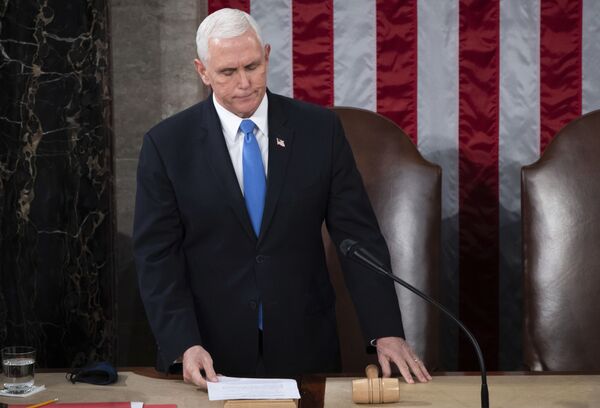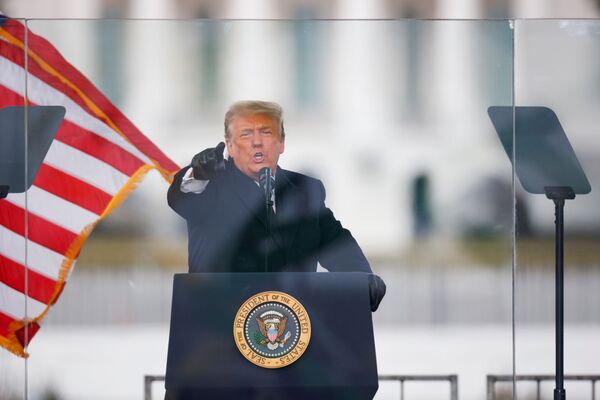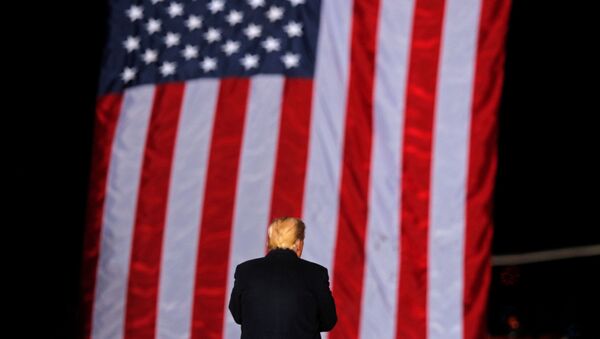The unprecedentedly violent events of 6 January, when supporters of President Donald Trump stormed the US Capitol building, have prompted a growing chorus of voices to urge that the incumbent POTUS be removed for "inciting" riots that left five people dead.

The lawmakers were able to complete their mostly symbolic procedure hours later, after order had been restored with the help of boosted police and National Guard, declaring Joe Biden the next US president, with the inauguration set for 20 January.
However, the chaotic events that unfolded in Washington DC led many of Trump’s opponents, including House Speaker Nancy Pelosi, Senate Democratic Leader Chuck Schumer as well as some members of his own Republican Party (GOP) to urge that the president be removed for "inciting" the riot.
Despite the fact that Trump’s statements addressing his supporters at a rally in Washington on the 6 January did not include any explicit calls for a violent attack, even some former members of his administration, such as General James Mattis, Trump’s first secretary of defense, and General Joseph Dunford, ex-chairman of the Joint Chiefs of Staff under Trump have levelled accusations against Trump for ostensibly goading the ‘mob’.
‘Assault on Democracy’
Although Donald Trump has already committed himself to an orderly transfer of power to Democrat Joe Biden, explicitly stating this in a recorded video address from the White House, with just 13 days left until the inauguration, the top two Democrats in Congress have called for the President’s removal from office, either through a second impeachment or by invoking the 25th Amendment.
Saying that President Trump “committed an unspeakable assault on our nation,” Speaker Nancy Pelosi called on Vice President Pence to remove Trump from office by immediately invoking the 25th amendment. If he doesn’t, she said Congress may move to impeach. https://t.co/vOphy3SIRS pic.twitter.com/tsDH80USBw
— The New York Times (@nytimes) January 7, 2021
House Speaker Nancy Pelosi at a news conference singled out individual Cabinet members, urging them to intervene, saying:
“While it’s only 13 days left [for Trump’s presidency], any day can be a horror show for America. Are they ready to say for the next 13 days this dangerous man can assault our democracy?”
Senate Minority Leader Chuck Schumer similarly urged Congress to reconvene for emergency impeachment proceedings against Trump.
Democratic Assistant House Speaker Katherine Clark, calling on Pence to remove Trump, threatened that the House would start impeachment proceedings by the middle of next week if he fails to do so.
There are several options that could potentially achieve Trump being ousted from office.
The 25th Amendment
Invoking the 25th Amendment, in force since 1967, and broken down into four sections, allows the vice-president to become acting president when a president is unable to continue his duties. This might be the case when he or she is incapacitated because of a physical or mental illness.
Section 1 specifies that the vice-president becomes president if the latter is removed from office for any reason.
Section 2 clarifies how presidents should fill a vacancy in the vice-president’s office.
Section 3 says that the president can make his vice-president an acting president by submitting a written declaration to the president pro tempore of the Senate and the speaker of the House of Representatives.
Although all three sections have been invoked since 1967 - for example when Gerald Ford became president after President Richard Nixon’s resignation - Section 4 has never been invoked.

Section 4 of the amendment that was enacted after the assassination of John F Kennedy to clarify succession issues in contingency situations, would allow the vice-president, together with a majority of either the president’s cabinet or a body designated by Congress with a law, to declare the president “unable to discharge the powers and duties of his office”.
Since the amendment’s passage, there has been a debate as to what “inability” means.
The late former Senator Birch Bayh, who authored the constitutional amendment, was cited as telling his staff that the fourth clause should only be invoked “if the President was as nutty as a fruit cake. Mental illness, pure and simple, is the only time this provision would be used.”
However, if the 25th Amendment were, indeed, to be invoked, a letter would first have to be signed by the vice-president and a majority of the cabinet, addressed to the speakers of the Houses of Representatives and the Senate, declaring the president unfit to govern, or incapable "of discharging the powers and duties of his office". This would grant Mike Pence the powers automatically to take over the reins.
Should the sitting president contest the findings, he is allowed to present a written response, leaving Congress to decide the outcome, with a two-thirds majority vote needed from both the House and the Senate to place the vice-president in charge.

The vice-president would be acting as president until the issue is resolved. At present, as matters stand, it is reportedly unlikely that Mike Pence and at least eight cabinet members would break with the president to invoke the amendment.
Pelosi said during a Thursday press conference that she was looking forward to hearing from the vice-president “as soon as possible and to receiving a positive answer as to whether he and the Cabinet will honor their oath to the Constitution and the American people."
However, sources have been cited by Business Insider claiming that Mike Pence - despite reportedly breaking with Trump earlier over his demands that he use his constitutional position as president of the Senate to seek an overturn of the election result - is against invoking the 25th Amendment.
There has not yet been a comment from a spokesman for the vice-president.
Impeachment
Should the vice-president fail to act upon the calls of those demanding a removal of the sitting president, Nancy Pelosi has intimated she is prepared to convene the House of Representatives to launch their second impeachment proceedings against Trump.
Previously, in December 2019, President Trump was impeached by the House of Representatives for abusing power and obstructing Congress amid claims he pressured Ukraine into investigating the Biden family’s dealings in that country.
However, Trump was not removed from office by the Senate, which acquitted him 52-48 on charges of abuse of power and 53-47 on obstruction of Congress over charges relating to his dealings with Ukraine.
If the impeachment process were to get underway, Trump could potentially become the first president in history to be impeached twice.

In order to get Donald Trump impeached, the respective charges against him must be brought to the House and passed in a vote, pending which the case moves into the Senate. A two-thirds vote would be required by the lawmakers to oust the president from office.
At this point, the time factor becomes relevant, as it is unlikely, according to US media reports, that there is enough time for the impeachment process to be carried out ahead of the inauguration on 20 January.
There is also no indication the Democrats would achieve required numbers in the Senate, where they only hold half the seats, to help their case.
Could Trump Pardon Himself?
Donald Trump has reportedly indicated to aides he is considering granting a pardon to himself in the final days of his presidency, according to sources cited by the media, as he faces a number of potential litigations amid probes into whether he misled tax authorities, banks or business partners.
Though there is no precedent for a US leader to issue such a pardon, some legal experts have previously said it is not possible to achieve legitimately.
Reports refer to an opinion issued by the Department of Justice ahead of former president Richard Nixon's resignation that he could not pardon himself "under the fundamental rule that no one may be a judge in his own case".
There is also the opinion that the US constitution does not preclude a self-pardon.


